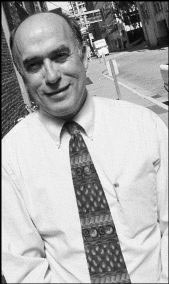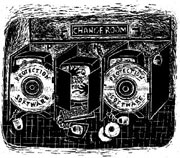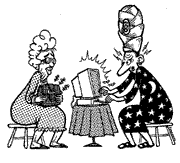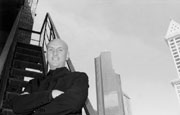THERE IS NO such thing as a quiet election involving King County Council member Dwight Pelz. Not only does Pelz favor acerbic humor and have a fierce debating style, but he always draws opponents who are harsh critics of his performance in office.
This year is no exception. In September’s primary, Pelz is being opposed by another Democrat, Mark Wheeler. Since there are no other candidates in the race, whoever wins the primary is nearly guaranteed the office.
Wheeler is a man on a mission. As he describes it, King County’s 5th District— which includes the diverse Rainier Valley, the multiracial communities of White Center and Boulevard Park, and parts of three small blue-collar cities— has been lacking leadership for years, and he’s just the guy to do something about it.
He says that Pelz, the district’s County Council member since 1997, has not been responsive to the community on a variety of matters and is part of a dysfunctional County Council that cannot get things done. At 50, Wheeler has been an attorney in Seattle for the past 15 years. His campaign material stresses his deep roots in the city’s African-American community. In place of specifics on many subjects, Wheeler leans on his experience as a lawyer and a community activist able to forge alliances and build consensus among disparate groups.
Pelz also stresses his community involvement. Before getting elected to the state Legislature in 1990, Pelz spent 18 years as a labor and community organizer. He built a reputation as an impassioned liberal whose major victories included the repeal of the sales tax on food and the limiting of Seattle City Light’s involvement in the WPPSS nuclear power plant debacle. In the Legislature, Pelz was famous as a gadfly who introduced a state income tax year after year and was praised as a smart coalition builder who convinced key Republicans that Seattle’s public schools needed more funding.
Despite the adversarial tone in this election, Wheeler and Pelz have largely similar stands on most issues. Yet they disagree strongly on at least two things: Sound Transit’s light rail and the construction of churches in rural areas.
Pelz is a candid supporter of light rail. While Pelz wanted light rail to be in a tunnel through his district, he did not abandon support for the project when he lost that debate. Pelz continues to support light rail despite the recent controversies surrounding the project. “There’s a real question of whether we’re capable of making a decision for transportation relief or not,” he says. “I’ve tried to provide some leadership by telling people the truth about this, which, frankly, a lot of politicians have not.” Pelz believes the $1 billion cost overruns on light rail reflect the real world price, one politicians should have acknowledged years ago. He says if we build light rail now, in 20 years it will be a huge success.
Wheeler believes light rail is an expensive boondoggle that will do little to solve the region’s long-term transportation woes. “We don’t have a hub-and-spoke sort of community,” he says, criticizing the downtown focus of the current transit plans.
Wheeler claims that building a surface light-rail line down the middle of Martin Luther King Way would kill many of the small shops and restaurants on the route during the two years of construction and create an ongoing hazard for pedestrians, especially children, once it was completed. In its place, he is calling for bus-only access lanes on the freeways and a new look at monorail as a regionwide alternative. He says monorail would be both faster to build and less disruptive than light rail.
The two men also differ on the issue of allowing large churches to be built in rural areas of King County, a topic that was fiercely debated by the County Council this year.
Wheeler, who has long-standing associations with church-based schools and services in the black community, says, “When you are developing in the rural area, you can strike a balance between growth and the environment.” However, he also believes that churches have a First Amendment right to buildings that they think will serve their needs. He favors a permitting process that would depend on a case-by-case review.
Pelz, on the other hand, favors strict environmental controls on the construction of new churches in rural areas. He sees limiting megachurches as a key part of stemming runaway sprawl in King County. Saying his opponent’s position is “contradictory,” he explains, “You can’t say you can’t impact freedom of religion and then say each [church construction] project is subject to review. You can’t have it both ways.”
Voters can’t have it both ways, either. They have to choose one man or the other on Sept. 18.








